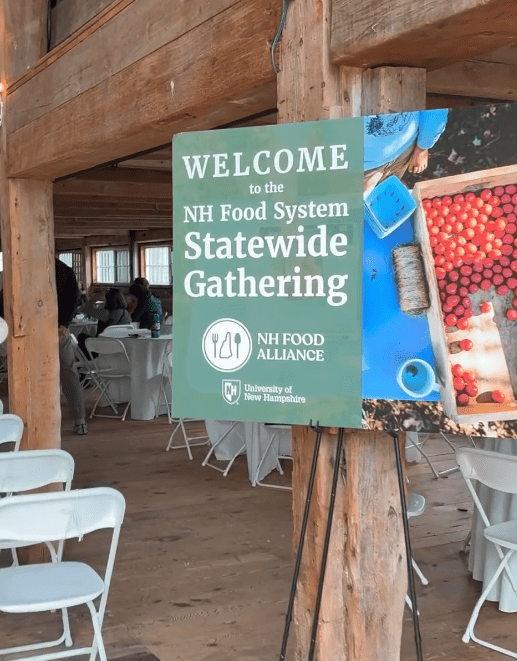The New Hampshire Food and Agriculture Strategic Plan was released in March of 2025 after 18+ months of work and collaboration from over 89 food system organizations, including Land For Good, and hundreds of individuals deeply committed to New Hampshire’s food system. The Plan is the first of its kind in New Hampshire and will serve as a roadmap toward positive change in the state’s food and agricultural system, streamlining our collective efforts to obtain funding, develop programs, pass policies, and build networks to increase farm, fish, and food business viability and foster equity across our food system.

The cover of the Strategic Plan features “Sunrise Approach” Cathedral Ledge in Bartlett, NH and was created by Alexis Stefano.
The Strategic Plan proposes over 140 recommendations that address 27 agriculture and food-related topics through Product, Market, and Issue briefs. Each recommendation lays out suggested action, from policy changes and funding opportunities to program expansion and technical assistance — and the stakeholders best suited to address it.
Land For Good had the opportunity to serve as lead author on the Farmland Conservation, Access, & Succession Brief. As the New Hampshire Field Agent for Land For Good, I was proud to help spearhead our organization’s involvement. New Hampshire’s food system is dependent on the ability of farmers to access, protect, and transfer farmland and farm businesses.
The brief addresses the importance of farmland conservation and protection in the state, the need to support new and beginning farmers accessing land and entering the agricultural marketplace, as well as the need to support exiting and retiring farmers with succession and transfer planning.
“In Summary
New Hampshire faces a challenge: while the average age of farmers and development pressure on farm-land increases, a farmer’s ability to access land is decreasing. Protecting farmland, improving farmland access, and supporting successful farm transfers to the next generation is of vital importance. Permanent conservation plays an important role in securing the future of New Hampshire’s farmland and can be a valuable tool for farmland access and transfer. Increased funding for local and state conservation programs and land trusts will increase prioritization and outreach of farmland protection efforts.
Farmland access is a significant barrier for many farmers. Service providers need dedicated funding to investigate alternative methods of land access and tenure that improve a farmer’s ability to access land, while breaking through systemic inequities in the land access system. There are opportunities to reach non-farming landowners and educate them about the possibility of leasing potential farmland to a farmer. Supporting successful farm transfers helps reduce the bottleneck in farm access caused by the inability of exiting farmers to transfer their farms to the next generation. With dedicated funding, there is opportunity to improve outreach and support for farmers to develop farm succession plans, thereby promoting secure retirement for the outgoing generation and the successful transfer of farmland to the next generation. All of these initiatives require dedicated funding for the programs that support them, as well as for the development of new programs that may be beneficial.”
At Land For Good, we’ve helped hundreds of farmers and partners find innovative solutions that keep their farms in farming, provide a meaningful legacy, and address the financial, legal, and business challenges involved in transferring a farm to a next generation family member or unrelated successor. We see the need for viable farm succession planning as the flip side of the land access coin. Sound succession planning increases the likelihood that farmland will be transitioned smoothly to the incoming generation of farmers.
The Farmland Conservation, Access, & Succession Brief proposes recommendations for dedicated state, federal, and private funding to provide for;
- Direct technical assistance, programming, and mediation for farm succession programs
- Direct technical assistance, mentorship, and capital for farmland access programs
- Agricultural conservation easement programs and supporting organizations such as land trusts and conservation districts
New Hampshire Food System Statewide Gathering

In addition to spearheading the creation of the NH Food and Agriculture Strategic Plan, the NH Food Alliance recently hosted the NH Food System Statewide Gathering. This year’s gathering was a jumping off point to putting the strategic plan into action.
“In order for food grown, raised, and caught in New Hampshire to remain a fixture in the lives and culture of Granite Staters, everyone has a role to play. The Strategic Plan brings together many voices, opinions, and experiences into one comprehensive playbook we can look to for guidance in the years ahead.”
Commissioner Shawn Jasper, NH Department of Agriculture, Markets, and Food
Lead organizations were invited to dive deeply into the strategic plan content through breakout sessions that facilitated brainstorming and the advancement of the recommendations outlined in their respective briefs. Many partners came together for this gathering with almost 200 attendees.
I was fortunate to lead a breakout session, together with our UNH Extension partner, on the need for strengthening farm business technical assistance in the state. Many resources exist relating to farm business planning, but there is no succinct pathway for how to find them or which resources are appropriate for a given situation. We believe farmers would benefit from farmer specific business planning services that funnel farmers through cohesive programming with variations offered depending on the phase of their business.
Despite the challenging times farmers face, there continues to be forward movement and room for opportunity in the New Hampshire food and agricultural system. The creation of the first ever New Hampshire Food and Agriculture Strategic Plan provides a meaningful foundation and roadmap for positive change, one that is grounded in the goal of increasing the farm, fish, and food business viability and equity in our state.
I am excited to see how the recommendations presented in the Plan increase the viability and sustainability of New Hampshire’s food and agricultural system moving forward.





